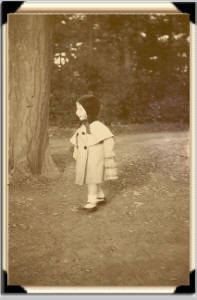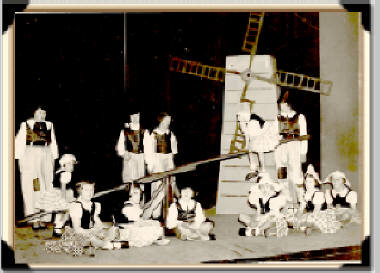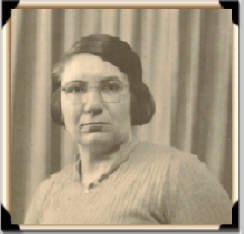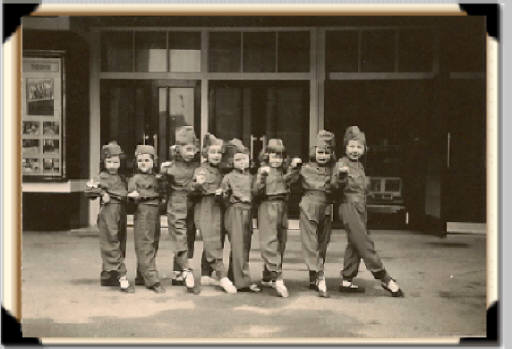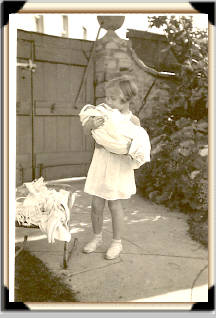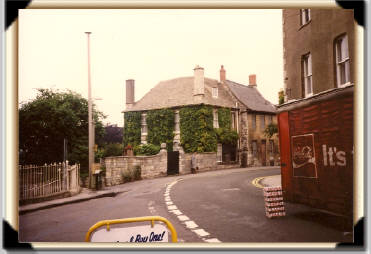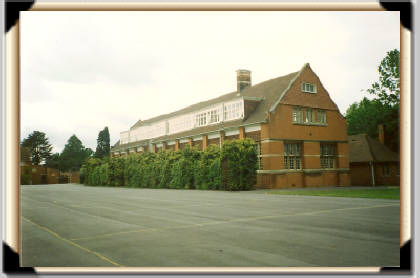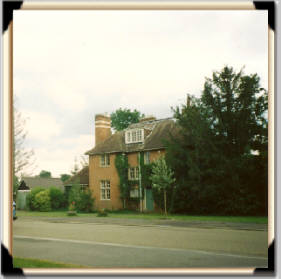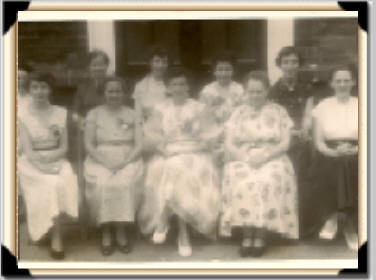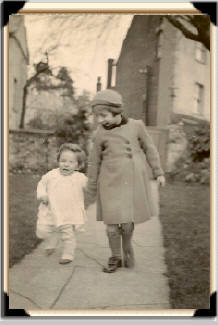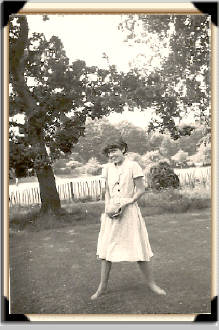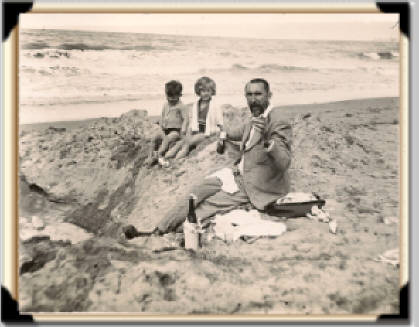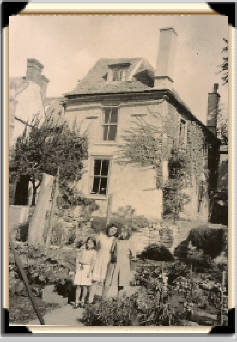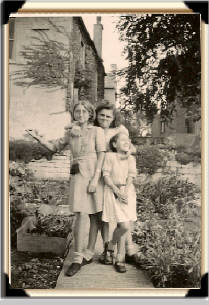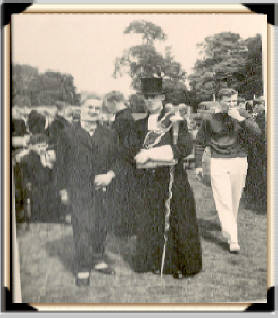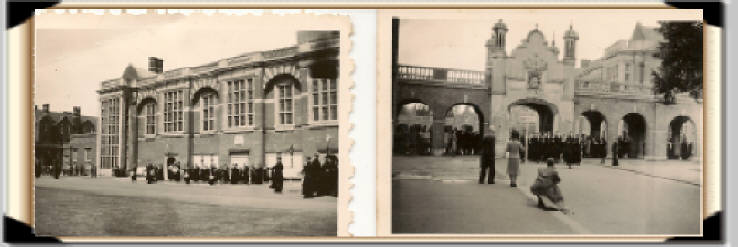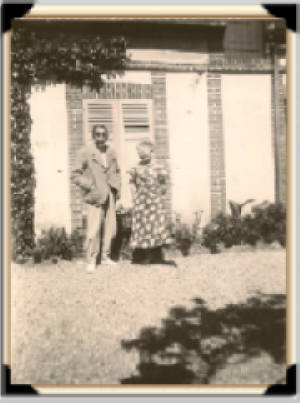
"The Wine is at an End"
It was World War 2. My grandparents and my great grandmother were now resigned to living, yet again, under German occupation. I say, yet again, because my great grandmother had already lived through the Franco Prussian war in 1871, as well as World War 1. As you can imagine, she was very bitter, having suffered serious deprivation each time. Now in her late 70's she had to be reminded to keep a civil tongue in her head; not to voice her true feelings about the Germans in public.
They had tried to leave France ahead of the invading German Army, in 1940, but turned back before reaching the coast, having given up all hope of reaching England, where their married daughter, my mother, was then living. There were insufficient boats to take the great number of people attempting to leave the country. As the German Airforce was strafing the main roads, Grandmere, Pepere and Memere stayed at a farm away from the main road, until the bombing had ceased. Then sadly, they returned to "Sans Souci" their home in the small farn1ing community of La Madeleine, near Nonancourt, Normandy.
Ironic, the peace time choice of name for their house. Translated, sans souci means "without a care."
My grandfather was Mayor of the village during the war years. He had excellent contacts with all the local farmers, who relied on him to advise them when the Germans were about to requisition heavy machinery, horses or water tankers. It was amazing how often machinery needed hard to find spare parts, horses were lame and water tankers had been used for transporting liquid manure.
My grandparents survived the years of the occupation, despite hard winters and severe shortages of the most basic items, such as soap, sugar and flour. Pepere had a very productive garden, providing them with fruit and vegetables. He kept hens and rabbits, so they were rarely short of meat and eggs. Local farmers usually had some milk and butter to spare, so life was tolerable.
But worse was to come. Prior to the occupation of their vi.IIage, my grandparents had buried their small stock of wine, so that the troops wouldn't find it. If there was a special occasion to celebrate, one precious bottle would be disinterred and savoured. Then in 1943, yes, you've guessed it, the good wine was at an end, but the war wasn't.
Wembley 1937
I like my new winter coat. The velvet hat feels so good and keeps my head wann on this cold, windy day. This road is so long, noisy and dusty. There are so many cars and buses, but Mummy is with me, so I feel safe. I wonder where we're going. What's that awful smell? Mummywhat's that awful smell? Mummy?? Where is she? I can't see her - Mummy!
School 1938
I'm sitting in a big school hall. We've been told to sit with our legs crossed. It's very hard to do. I don't know anybody. Everybody has friends except me. Nobody is talking to me. I wish I was at home with my Mummy. I don't understand what the lady is talking about. She says we have to learn the words of a hymn. I don't know what a hymn is. I thought it was a man, but I'm wrong, it's a kind of song.
So many words to say. I can't remember them all. The other children's voices are so loud and I can't understand them. They don't talk like my mummy and daddy.
I've been sitting for such a long time, my legs hurt, but I've been told to keep them crossed and sit up straight, so I will, if I can.
It's hot in here. Some ofthe children smell,! don't like it. Why is that boy pulling faces at me?
Oh dear, I need to go to the bathroom. Where is it? Mummy said I must put up my hand if I want to ask for something. Goodness, all the children have put up their hands. Do they all want to go to the bathroom? I sit up very straight and look hard at the lady in front, she will see me and then I can ask her where the bathroom is.
She's seen me - "Please can I go to the bathroom?". Why is everybody laughing at me? Why is the lady asking me about a green hill without a city wall? I hope I can go home soon. I don't like school .
Stroud 1938
Dancing Days
As a five year old, I was taken to dancing lessons. This meant an hour's torture, once a week, at Miss Cox's School of Dance. The large upstairs room in a draughty 18th century building that was heated by hissing, popping, spluttering gas fires which did little to comfort me as I tried to follow Miss Cox's instructions and keep time to the uninspiring music played on a yellow-toothed upright piano.
It's cold and draughty in the dressing room behind the stage, but when the last dancing pupils anive and the door is finally closed, the smaIl gas fire, hissing and popping, gives a semblance of warmth. The excited girls have their make up applied, costumes checked and. position themselves in the wings. One little girl is terrified.
This is a totally new experience. The tension amongst the dancers manifests itself in nervous giggles, unnecessary adjustment of costumes and retying of sticky shoe laces.
Billowing backdrops brush eerily against the girls at the rear of the stage. The odour of gas fires, perspiration and grease paint permeates the dusty atmosphere. Proud parents in the audience add their particular perfume; Evening in Paris, wet winter woollens, pipe tobacco, cigarette smoke and here and there a whiff of infrequently washed bodies.
Standing room only. It seems that the whole world has come to see us.. Miss Cox, our terrifying dancing teacher, stands in the wings hissing "Smile!"
Tears trickling down my cheeks, nose starting to run, smiling is impossible.
Stroud 1939
The first time I went to hospital
I wish I was going to school today. There's my friend Winnie. She's lucky. She doesn't have to go to hospital like me. I'm not really sure what hospital is, but Mummy said that if I went there, I wouldn't get any more coughs and colds and sore throats.
It's a miserable day. It's cold and damp and the wind is blowing the leaves and rubbish around our legs as we go past my school.
So this is the hospital. It's a very big building, bigger than our house and bigger than my school. I don't think I want to go inside, after all.
Mummy says I must, so we're going through the heavy swing doors into a place called reception. What a strange smell. I don't like it. Mummy says the smell is antiseptic and it keeps everything clean. I'm glad I don't have it at home.
A lady in a white dress and a funny little white hat is taking us to the children's ward. I wonder why she has a watch pinned on her dress. Perhaps the strap has broken.
So this is the children's ward. Mummy says I'll be here for a week. A week is seven days. That's a long time to be away from home. Perhaps I'll find someone to play with.
What a huge room - and so many beds. The beds have such long legs. I don't know whether I'll be able to climb up by myself at bed time.
There's a lot of noisy boys running around in pyjamas. I wouldn't like to play with them. I can't see any little girls, there's only big ones.
The nurse says I have to have a bath, put my nighty on and get into bed. But it's still morning. Why do I have to go to bed? I don't need a bath either. I had one last night. I can't be dirty already.
What a big, cold, bathroom The bath is huge. It has feet like lion's paws and the taps are gold. .
The nurse is washing me all over. I wish she wasn't so rough - and what smelly soap. She says its carbolic soap. Even now I'm dry I still smell of it.
Back to the children's ward and the nurse is lifting me up onto a bed at the far end of the room, away from all the other children. Mummy is saying goodbye. I don't want her to go, but she says she must, to look after Daddy and Sylvia. She'll come back after seven days and I'm to be a good girl and do everything that the nurse tells me.
Mummy's gone. The nurse is telling the noisy boys to get back into bed and behave, because the doctor is coming.
The doctor has a white coat and a funny looking necklace. He touches me with the necklace. It's so cold. He says he'll see me in the afternoon. Then he tells the nurse not to give me any lunch. No lunch? Why can't I have any lunch? I'm not sick or naughty. The nurse says I can have jelly and ice cream after I've been to see the doctor, just like a party.
At last, something is happening. My bed is being pushed through the ward, down the passage and into a strange room. There are bright lights overhead, and they. are all shining on me. The nurse is lifting me on to another bed and some people in green clothes and hats are looking at me. One of them has a black thing in his hand. He wants me to smell it. "Take a deep breath", he says. I do. "Count to ten", he says, and I do "1..2...3 4 5 "
I'm back in the children's ward again. Mummy was wrong. The doctor hasn't made me better. My throat is so sore. I don't even want ice cream and jelly.
I want to go home.
Stroud - 1939
Raven haired, powerfully built, well muscled body and the gentlest brown eyes I have ever seen.
We'd meet him most days and our passing would be acknowledged by the briefest nods. Then one day my mother and I paused, as he looked over the high garden wall.
Mum raised her hand in greeting. He bared his teeth, snarled, growled and went for her. Luckily she was unhurt, but as a six year old, I was deeply affected by this incident and still have a deep seated mistrust and gut wrenching fear of all dogs.
Dancing Days
Stroud 1940
A few more years of lessons and a change from ballet to character dancing, made Saturdays more enjoyable. There's a photo of me actually smiling, leading a row of khaki clad look alikes for a 1940's performance of "We'll hang out the washing on the Seigfreid Line". Whether we helped the war effort is dubious.
Eventually I persuaded my parents that I would like to take up another hobby, as my. dance exam results were not impressive. I suspect that if the classes had been less structured, more fun and the music more stimulating, I would not have given up so easily.
I must have been about ten and my sister five years old, when we discovered the excitement of dancing to our favourite records. If we knew our parents would be out for an hour or so, we would close the thick green velvet curtains in the drawing room, push back the heavy, boxy armchairs and with the gramophone volume at maximum, we would let ourselves be swamped and taken over by the driving beat and excitement of the Sorcerer's Apprentice.
If we were in a more relaxed mood, The Skaters Waltz and the Blue Danube would have us dipping, swaying and twirling elegantly (we thought), our wartime, cast off, cut down, 'make do and mend' clothes, transformed into silks and satins.
Checking the time on the corned beef coloured marble mantlepiece clock, there would be a scramble to restore the room to its original order. With flushed cheeks we would welcome our parents back home and assure them that nothing untoward had happened whilst they were out.
Jews
A pejorative word, when used by many of the older generation. A word spat out in disgust, indiscriminately and ignorantly condemning the whole Jewish race.
Whenever this happens, my mind goes back to a ten year old girl who started school in the middle of term in 1941. She was Jewish and had been smuggled out of Austria to escape the Nazi led progroms of the second world war.
Lisel was intelligent, gentle and of slender build. Her dark wavy hair softened her thin haunted face. It is only in retrospect that I fully appreciate the reason for her sadness, her reserve.
None of us had lost our parents or were being looked after by strangers in another country, with a foreign language and a different religion.
What had she done to deserve this?
MINNIE'S MEMORIES - VOLUME 1
MY EARLY YEARS
.
Stroud 1940
Mum is Vulnerable
As a seven year old, I enjoyed being out of doors, climbing our gnarled, lichen covered apple tree, swinging on the swing, playing in the sand pit with my two year old sister, or scrambling atop the high wall, which separated our garden from the orphanage below.
I was fascinated by the children who lived there. They often wore faded felt berets, pulled down over their ears, berets which were worn all day, and possibly all night.
I saw Daisy, Lily and Ivy playing together in the orphanage grounds, Daisy's beret was knocked off. What a shock. She was completely bald and had purple streaks and blots on her shiny head.
"Ringworm", my mother said, knowledgeably. I was called in to have lunch. The radio was on as usual. We listened to all the news programmes. No one was allowed to talk. My parents seemed worried about something, but didn't explain. Was it something I had done, or not done? They never discussed their concerns when we were around.
"Pas devant les enfants", my French mother would say warningly to my father.
On this particular day, my mother, tall, strong and always busy, cooking, cleaning, preserving fruit and vegetables, gardening, making and mending clothes, shopping, doing the weekly wash in the outhouse, and in her spare time doing voluntary work in the school canteen or at the Forces Club; was sitting very still, except for her hands, which seemed to have a life of their own.
For once I listened to the news reader. "Paris has fallen", he said.
And so had my mother. She had fainted. What she had feared for so long, had happened. She realised that her parents and grandmother, fleeing from their home in Normandy (France) would never reach the safety of England.
It was then that I realised that Mum was vulnerable.
Stroud 1941
My Attic Room
Up the creaking wooden stairs, worn down by over two hundred years' use, was my bedroom. Under the eaves of the steeply pitched gabled roof, was my sanctuary. A very small room, with a very large bed. A 'Put-U-Up'. A splendid piece of furniture which doubled as a bed or a settee.
Covered in green uncut moquette, with sumptuously padded arms and back, it extended to make a comfortable bed. The arms had hidden compartments, in which I could keep my treasures safe from my little sister, who was not yet strong enough to lift the lid.
Lying in bed, safe from the wintry gales which lashed the small bottle glass window, and battered the house, I looked yet again at the gnarled oak beams which supported the slate roof. Was that a deeper crack? Would the beams be able to take the strain
of the heavy roof for much longer? Had the woodworm survived the recent spraying and continued to weaken the beams?
Reassured that all was well, I snuggled down, toes grateful for the comforting stone hot water bottle, one arm exposed to the chill draughts, to hold my latest Enid Blyton book.
Drawn into the exciting world of "Mr. Galliano's Circus" I lost track of time and place. From the depths of the house, a stentorian voice broke into my fantasy world, insisting that it was time to turn out the light.
How could I? I was in the middle of a chapter and loathe to put my book away.
So immersed was I, in Carlotta's adventures, that I wasn't aware of the squeaking of the stairs and the click of Dad's wedding ring on the bannister; my usual warning to put my book away and feign sleep.
Ripping back the bedding, Dad caught me, book and torch in hand.
"That's it," he said. "We've warned you before, about reading after lights out. No books for a week. Then maybe you'll do as you are told."
No books for a week? Dad couldn't be serious! He was, Mum backed him up too.
It was a relief to get to school, at least there, I was able to read, even if there were only text books. But there were still, endless, bookless evenings to get through, before the seven days were up.
The day came when life was back to normal. Reading voraciously to make up for lost time, but dutifully turning off the light, when told to, I was grateful for the full moon. With straining eyes, I read on.
Deprived!
As a family, we were deprived. Not in the usual sense of being poor, malnourished or dysfunctional; but we were deprived of that rich legacy of English sayings, which so many children absorbed as part of their heritage.
At the age of ten, my primary teacher discovered that I had no knowledge or understanding of sayings such as, 'Out of the frying pan into the fire.' To help me pass the 11+ exam, she gave me a crash course in, to me, some very puzzling statements such as, 'The pot calling the kettle black'. Coming from a family who took things literally, I found it hard to make the connection by this roundabout way of talking.
My sister, who is nearly six years younger, had a similar problem.
Even to this day, I rarely use these sayings, probably because they were painfully acquired by rote learning and seldom used at home.
On reflection, my father had his own particular statement, 'If a job's worth doing, it's worth doing well.' This became his credo. If he'd had a headstone over his ashes, we would have been tempted to make it his epitaph. We used to quote it behind his back, sometimes in admiration, but often in exasperation. To do a job well, meant that Dad would spend considerable time discussing a project from every conceivable angle with the intended beneficiary. Then would come the careful measurements, the beautifully drawn plans and the search for suitable materials in his immaculate workshop.
Eventually everything was ready for work to start. Mum used to dread the days when Dad made improvements in the house. Like my sister and I, she was rather slapdash and impatient. She had to restrain herself from suggesting short cuts in order to get the job done quickly. Nothing would do but a serious 'belt and braces' job. After all, if the job was worth doing, it was worth doing well, as we well knew. Besides which, Dad liked to admire his handiwork and be able to say, in all honesty, that it was, 'A good, solid job.'
![]()
Stroud 1941 –
My Bad Tempered Music Teacher
Mrs Frost was a short tempered, sarcastic music teacher who had her favourites. The chosen ones basked in the knowledge that they couId do no wrong, whilst the others, myself included, dreaded Friday morning music lessons. We were the butt of our teacher's caustic humour, which left me feeling totally inadequate in matters musical.
Because I had a naturally low pitched voice, more suited to a tenor than a soprano, I was unable to sing the tonic sol-fa scale at the required pitch, as others could, so was branded as a non singer. As I didn't attend private piano lessons, I couldn't reel off the names or values of notes when presented with a sheet of music, so I was incapable of sight reading and singing.
I became so nervous of being singled out, yet again, for my inadequacies, I kept a very low profile, mentally blending into the cream coloured wall for as long as possible.
The only bright spot in Mrs Frost's lessons were when we were allowed to read from the B.B.C.'s illustrated booklets about the lives of great composers. As an avid and fluent reader, I would skim rapidly through, whilst the sycophantic star pupils who were not necessarily good readers, would be invited to stand up and stumble through the text - No criticism for them, just "Thank you dear. "
It's taken many years to realise that I did have musical ability and to make the most of it.
As second alto, I have growled happily away in the lower register at the local Choral Society and the evening class Madrigal Choir. I've taken up handbell ringing which requires precision timing, rhythm and the ability to read music.
With my inborn sense of rhythm, and enjoyment of Eastern European folk music I dance too. All this has been achieved by finding a supportive environment, where criticism is not allowed - nor are apologies.
With hindsight, I realise what a poor teacher Mrs Frost was. Through her inadequacies I lost many years of pleasure in music, but latterly I've made up for much lost time and hope to leave this earth in mid-pirouette.
Sylvia
She was five years younger than me. She was small. She was thin. Her shoulders were hunched, her complexion sallow. She ran out of breath easily. She wheezed and gasped for breath. She was my sister. She was my long promised friend and playmate.
I was bitterly disappointed. I was a tomboy and was to be found at the tops of trees or building huts in the derelict railway yards under the echoing viaduct. I had a gang of like-minded'friends who joined me in daring exploits along the canal, across the lock gates and through the marsh where the king-cups grew. My sister had to come too.
It was only in my teens that I began to admire my asthmatic sister. We had a long exposed walk to the school bus stop, a nventy minute drive in an ill ventilated bus, followed by a long walk at the other end to get to school.
One particularly bitter winter's day, with the cruel east wind blowing, my sister, who had had an asthma attack during the night, was told that she could stay at home for the day.
If I'd been her, I would have agreed. Not Sylvia. From hidden reserves of strength, she decided to face the wind and weather and go to school. I vividly remember that brave little figure, battling the icy wind, gasping for breath as she struggled to get to the bus stop on time.
She's still living her life to the full. She still refuses to give in where others would have taken the easy option. I admire my little sister.
Stroud 1942
Slogan Saturation
My parents hadn't realised how indoctrinated I'd become, by wartime slogans, until one chilly night in 1942 they were woken by strange scuffling and thumping sounds from my bedroom, which was directly above theirs.
On investigation, I was found, in my pyjamas, facing into the comer of the room, making digging motions. I had no history of sleep-walking, so they asked me what I was doing and 'why I wasn't in bed.
Apparently I replied in some indignation that I was "Digging for Victory".
My only recollection of this incident is of waking up in the bathroom, being told what I had said and then being bundled back to bed. .
The slogan "Dig for Victory" obviously had a big impact on me - as I'm still digging 55 years later.
Other slogans I remember were:
Keep Mum like Dad
Be careful, walls have ears
Make do and mend
All these messages were reinforced by Fougasse's delightful cartoons.
Stroud 1943
Gloria
Until I started singing choral music, Gloria conveyed a less exalted message. It was a name which up till then brought back memories of a steamy school changing room, scented with carbolic soap, where we pre-pubescent eleven year olds would shyly remove our P.E. clothes under an all enveloping towel, walk modestly to the curtainless shower, wash quickly with our faces to the wall, cover up again, and clutching our towels tightly, scuttle back to our allotted places where we attempted to dry and dress without exposing an inch of flesh between shoulders and knees.
Enter Gloria. Gloria was a very well developed girl. She literally gloried in her physical maturity. We discreteIy watched as she stripped off and displayed what most of us had never seen, except in art history books, which had not been censored by the art teacher.
Nonchalantly Gloria strolled to the shower, towel draped casually from one shoulder. A frisson of excitement broke out, only to be cut short by a crisp command from our highly respected P.E. teacher.
"Gloria - cover yourself'. She did, but her hip swivelling walk and toss of long wavy hair, told us that Gloria was not ashamed.
With hind sight I always replay this memory to the strains of "The Stripper". I wonder whether she ever achieved sequins and tassels fame?
Stroud 1943
The Great Mouse Massacre
My parents were quiet, law abiding people but if one thing upset them, it was mice. When food rationing became tight, each ounce of cheese and butter, each grain or flake of cereal, became more and more precious.
The winter of '43, my parents finally cracked. Never mind the threat of Nazi invasion, we had problems closer to home.
Mice were seeking sanctuary from the bitter cold weather and breeding prolifically behind the panelled walls of our living room. Skittering, scampering and squeaking sounds accompanied our meals, distracting our attention from gloomy news bulletins. We had problems on the home front. Dad was stirred into action. .
Rations intended for OCIK 1/2/3 and 4 (our, identity card numbers) were being shared with MOUSE 1/2/3/ 1,000. .
Armed with pokers and corks, waiting silently outside the larder, the nightly ritual began. As soon as a mouse was heard plundering our supplies, Mum corked up the known mouse holes, Dad isolated the miscreant, preferably in an open space, dealing deadly blows. The noise was unbelievable. Sylvia and I would seek safety in another room, away from our temporarily berserk parents. When all was quiet again, we would re-emerge, drawn by a morbid curiosity, to view the latest victims in the great mouse massacre.
Stroud 1943 Horsham 1948
As a ten year old, I read and dreamed about horses. I envied Sarah who drew them with such speed and skill. Flaring nostrils, Bambi eyes, tossing mane and plumed tail. Such creatures would have graced a Disney cartoon, but were never seen in real life.
The milkman's horse bore no resemblance to these fantasy creatures. It was stolid, blinkered and had stiff bristles on its aging muzzle. Every day there was a pause for refreshment outside our house. The milkman drank his bottle of black tea. The horse nuzzled deeply into its dusty nosebag. Revived, they would tackle the next stretch of the milk round, up the steep hill to the Leezes.
At the sound of the departing hooves, my mother and our elderly neighbour, Mrs Court, would erupt simultaneously from adjacent front doors, each with a bucket and shovel at the ready, to collect the horse manure for their gardens. So much for the horse of my dreams. This was reality.
In my mid teens, we moved to Christ's Hospital, a boys boarding school, where my father was to be head of the Manual Training School. A lowly position, we discovered, in the staff hierarchy, as Dad was "only" a graduate of London University. The rest of the staff were Oxford or Cambridge graduates and made their perceived superiority quite clear.
My sister and I went to the local state school, so were regarded as not really suitable friends for the other masters' daughters. My friendship with the electrician's daughter was deemed inappropriate, not to be encouraged.
Despite the snobbery, I gradually got to know and be accepted by most of the Christ's Hospital staff children. I thought my wildest dream was about to be realised. Felicity owned a pony. Felicity said I could ride it
- if I could catch it. Off I went, full of high hopes. The pony was ill tempered, biting and bucking as I scrambled on to its back. Before I had a chance to gather the reins, the appropriately named Nipper, trotted to the nearest iron fence, trying to rub me off against the palings. He then took me under low hanging branches, on to the prized 1st eleven school cricket pitch, leaving deeply indented hoof marks from one end to the other.
Nipper came to an abrupt halt. I fell off and stumbled home. So much for my dream of riding effortlessly and elegantly in
harmony with my mount, admired by all who saw me.
The following day the school groundsman visited my parents and complained about my inability to keep a horse under control and the state of the cricket pitch after my equestrian efforts.
Banned from riding, I took to my roller skates and bike, finally accepting that even in my wildest dreams, horses were not for me.
Forest of Dean 1943
I'm only ten
A hot, airless tent. Just enough room for my friend and I, lying side by side, staring up at the yellow canvas and smelling the crushed bracken on which we are lying.
Looking through the tent flap, I see the sun setting, the stars appearing. The sounds and silences of night taking over from the familiar bustle of day.
I drift off to sleep only to struggle back to wakefulness as I become aware of an acrid smell of cigarettes, sweat and beer.
Someone is lying heavily beside me
- touching me - whispering "Don't be afraid, I won't hurt you, just be kind to me - I only want to cuddle you."
I don't understand why my friend's father is in the tent, why he's so close to me. But I know it is wrong. I can't move - torn between my upbringing to do as I'm told and the deep seated feeling that I'm in danger.
Stroud 1945
Through Purgatory to Paradise
On that very special day, December 25th, we opened our Christmas presents, books, books and yet more books
- but there still remained one envelope. Sylvia and I had no idea what it contained. A book token perhaps? But no, it held four slips of stiff card, admission tickets to the Royal Theatre, Cheltenham, to see a pantomime called 'Cinderella', on December 31 st.
The next few days seemed to crawl past. We were so excited at the thought of a trip to Cheltenham to see our first pantomime and then to have tea at Cavendish House, a unique event for us in those years of post war austerity.
The great day arrived. As this was a very special occasion, we dressed in our best, put on our winter coats, pixie hats, scarves and mittens to keep out the dank December cold, then walked excitedly down to the wind swept bus stop in the centre of town. With purpled knees and rosy noses, we scrambled on board the Cheltenham bus, eager to reach our destination and discover for ourselves the mysterious delights of a pantomime.
There was a major problem. Thirteen miles was a long way in a 1940's bus, which lumbered along the narrow winding roads of the Cotswold hills.
Grinding its way slowly uphill in gut wrenching low gear and bounding crazily downhill to make up lost time, the atmosphere in the bus became overwhelming. Tightly closed windows, clouded with condensation, were claustrophobic in their opaqueness. The lethal mix of cigarettes, pipes, sweat, mothballs, wintergreen and cheap, stale perfume combined with petrol fumes, was more than we could cope with.
As I tried to suppress the memory of the greasy pork chops we'd had for lunch, the dreaded symptoms started to make themselves felt. The beading of the upper lip, queasy stomach, hot and cold flushes, shortness of breath, cramping, heaving pains. With agonised eyes, we pleaded with Mum to stop the bus before we disgraced ourselves in public. The bus driver was most understanding. Our rubbery legs stumbled down the steep steps to the roadside. Greedily gulping the icy air, our stomachs gradually calmed down.
Noses blown, eyes and faces wiped, a barley sugar sucked and back into that hellish vehicle for the rest of the journey .
Sympathetic passengers allowed us to have one window open, which brought in sufficient air, to keep us going as far as Cheltenham without another ignominious emergency stop.
A brisk walk to the theatre restored our spirits sufficiently to enjoy the rococo glories of the royal red and rich gold foyer, illuminated by glittering crystal chandeliers, which overawed us with their magnificence.
Climbing the narrow concrete stairs to our tightly packed, tip up seats, in the Gods, left my asthmatic sister breathless, but she soon recovered and we settled down to enjoy ourselves.
Sumptuous curtains rose to reveal a village square, unlike any we'd ever seen in real life.
Colourfully dressed villagers made us forget the post war drabness as they made way
for the prince.
.
The PRINCE? Surely it was a woman? So began a lesson in pantomime tradition which two hours later, left us with memories of glitter, glamour, comedy, magic and music.
So many memories to savour. Sylvia and I revelled in being encouraged to SHOUT! "Yes she did"
- "No, she didn't" as the Ugly Sisters quarrelled yet again. We hissed and booed, vigorously too. But what caused us the greatest surprise and delight, was the sight and sound of our normally serious minded father, lover of classical music, singing with gusto,
"I'm only a little petunia in a pumpkin patch, a pumpkin patch, Oh won't you come and play with me?"
Afternoon tea at Cavendish House, the preferred watering hole for the middle aged matrons of Cheltenham, followed
by an uneventful bus ride home, thanks to our being able to fall asleep, rounded off a very special occasion for us all.
Many years later, I took my own two daughters to see their first pantomime in Oxford. I was appalled by the crudity and risque jokes. Had it always been like that, or have tastes changed?
Normandy 1946
The first time I set eyes on the straw thatched farm house in Normandy, I gasped with delight. It was surrounded by cider apple trees, laden with blossom. Ducks dabbled in the pond. Hens and chickens scratched busily near the house. Bees hummed happily in the honeysuckle arching over the door. Better still, horses and mules in a nearby paddock. I might be able to ride them – bliss!
My father knocked on the door, which was opened with some difficulty by a blowsy woman, closely followed by an unshaven man, hitching up his braces over a sweat-stained shirt.
My heart sank. Was this the family I would be staying with for three weeks?
They welcomed us into their mediaeval home. Uneven flagstone floors, heavy oak beams, ceilings festooned with ancient cobwebs and yellow with smoke from the wood burning stove and my host's excessive indulgence in Gauloise ciigarettes.
The farmer and his wife did their best to make me feel at home, even to the extent of tuning in to B.B.C. London. The sound of Big Ben was my undoing. In floods of tears, I assured Madame that I was not ill, I was just homesick.
A family conference was held. It was decided that I should stay in the village, at the grandmother's house. This was a great improvement, as the grandmother was a fanatical housekeeper. She didn't smoke, cooked good plain food, and best of all the earth closet at the end ofthe garden was light, well ventilated and regularly emptied. Hanging from a nail in the wall, within easy reach, were hung neatly cut squares of' Le Figaro'. This was civilisation indeed! Nevertheless, I was still very homesick and would write tear-stained letters home, vainly hoping that my stay would be shortened.
Eventually the three weeks came to an end. On the cross channel ferry, returning to England, I met a family from home and found myself thinking in French and translating into halting English before I could speak to them.
It was several days before I stopped thinking and dreaming in French.
As for the farmer's daughter, she stayed three weeks with us, spoke only in French, except on one memorable occasion when she saw a train in the valley below "Train" she said triumphantly.
Sadly - I was never able to speak French with my parents. I think there was too much pressure from an early age for me to speak correctly, and once I started school in England, English was the only language for me.
Christs Hospital 1947
We moved from Gloucestershire to Sussex in 1947. It was a change of culture, climate and connections for our family. We had left the west of England with its' warm, rounded accents, hidden valleys and steep wooded hillsides, across country, to south eastern England.
The harsh Sussex accents, open country side and living in the grounds of Christs Hospital, often known as the Blue Coat School, proved to be a challenge for us all.
Although my father had been a pupil at this well known charity school, he had not appreciated what snobbery there was amongst the staff, until he arrived with his hard earned external London degree and years of valuable and respected teaching,experience at Stroud Technical College.
It was some time before he was accepted by the Oxford and Cambridge graduate staff, as being worthy of their attention. The fact that he was head of the manual training did nothing to enhance his credentials with these academic snobs.
My sister and I had problems too. We were enrolled at the local state school, not the Private school, as were the other masters daughters. The fact that I cycled to school with the Christs Hospital electrician's daughter, was also cause for comment. She was deemed to be "well below the salt". But we had the last laugh. Our state school education was of a higher standard and we both went on to Teacher Training College. Leaving the pampered private school pupils well behind in the independence stakes.
Dancing Days
Horsham High School - Sussex 1947
English country dancing was a pleasant exercise, once I'd sorted out the basic steps. There was a great sense of satisfaction if I got through each dance without throwing everyone into total confusion, by going in the wrong direction, or offering my left instead of my right hand in a grand chain.
Miss Stubbs' classes were enjoyable for another reason. She was the owner of a look-alike dog called Pluto. Both dog and owner had bristly salt and pepper hair, aging bodies and a perpetually worried look. Pluto was given permission by the headmistress to come to school, as he got very lonely if left at home all day. The neighbours made it quite clear that they did not appreciate his mournful howls from 8.30 - 4 pm every weekday.
Pluto joined the country dance class and sat under the piano, howling lugubriously. Miss Stubbs played on, punctuating the music with terse cries of 'Shut up' or 'Be Quiet' - to no avail. The lesson invariably came to a halt whilst Pluto was escorted outside by his embarrassed mistress.
His muffled cries would still be heard above the thumping of feet and piano keys, but distance, whilst not lending enchantment, at least helped us to concentrate on the intricacies and technicalities of country dancing.
Dancing Days
Christ's Hospital
Once they had reached their mid teens, the masters' daughters were invited to the annual Grecian's (Prefect's) Dance. One of the social highlights of the year, it was held in the school library reading room. An elegant room with padded window seats, leaded windows and intricate parquet flooring.
Before the dance was held, it was suggested that all available, suitable young females and some not so young, attend the Tuesday afternoon dancing classes, to partner the Grecians. The classes were run by Mrs. Bates, the cricket coach's wife. She had the responsibility for vetting the 'girls' and ensuring that none of the estate staff attended, as it would lower the tone. My school friend, the electrician's daughter was not eligible.
Tuesday afternoon came, the gramophone was fully wound and Victor Sylvester's dreary, predictable music filled the room. Where was the excitement, the toe tapping, pulse rate lifting sound, that I had come to expect from watching Ginger Rogers and Fred Astaire on the screen at the local cinema?
The Grecians did nothing to elevate the pulse rate. Seen from a distance, in their historic school uniform, marching confidently along The Avenue to chapel or the Dining Hall, they looked like gods, to my naive eyes.
Close to, out of their accustomed male orbit, they were teen age, acne affected boys, ill at ease in this artificial situation, where they had to quickly acquire the sophisticated skills necessary for the Grecians' Dance.
Commanded to choose a partner and use the correct approach, they would mumble 'May I have the pleasure of this dance?' As no eye contact was made, it was sometimes difficult to decide who was being addressed. Once the confusion had been sorted out, the chosen female would be clasped firmly and painfully to their partner's prominent silver uniform buttons. The first step would usually lead to a flurry of apologies as we trod on each other's toes. Mine usually came off worse as my open toed sandals could not compete, or protect me from my partner's heavy black school shoes, more suited to square bashing than dancing.
To the saccharine sounds of Victor Sylvester and the strident voice of Mrs. Bates, we would lumber awkwardly round the room. ONE, two, three, ONE, two, three. At the end of each record we would be politely returned to our seats, where we would wait apprehensively for the next learner dancer to take us for a trudge round the room.
In desperation, Mrs. Bates would occasionally take a boy, press him firmly to her maternal bosom and try to inspire him to dance with accuracy, if not panache.
Christs Hospital 1948
High Jinks in the Hen Run
Making sloe gin was one of Mum's specialities. It was easy to make and the end result was superb.
On a fine autumn day we would scour the hedgerows for ripe sloes, a thumb nail sized, sour blue-black fruit which grew well in our area.
We would take the sloes home to be washed, pricked all over with a sharp needle, then steep them in gin and sugar for a year. By then, the deep plum colour and the flavour of the sloes had seeped into the gin - time to remove the now redundant fruit and bottle the gin.
Normally, Mum threw the sloes into the compost heap, but that year, she decided to give the hens an unexpected treat, little realising how it would affect them.
As usual, the hens rushed to eat whatever was offered - jostling each other to get the largest amount. It didn't take long for the gin-soaked fruit to affect the birds.
What a bacchanalian orgy! The normally dignified hens were losing their balance, leaping skywards, clucking and crowing inanely, collapsing in shuddering heaps. Definitely legless. Ever seen a hen with a hangover? 1 have - and it didn't improve their egg production either!
Horsham 1949
Prominently displayed in Horsham's best shoe shop, was the most attractive pair of shoes I had ever seen. After years of wartime austerity when everything was rationed and of poor quality, here were the shoes I had long dreamed of.
Softly gleaming leather, seams accentuated by precisely placed perforations, colour co-ordinated laces and, the ultimate in elegance, a deep fringed fall of supple leather over the instep. Beautiful brogues. How I yearned to be their owner.
My mother having just persuaded me, much against my will, to buy an eye catching tan and white dog tooth check coat, had to agree that the brogues were of good quality, fitted well and best of all, matched the coat. Promising to cherish and polish my new, expensive shoes and only wear them for best occasions, I went home rejoicing.
Not long afterwards, there was the ideal opportunity, I thought, to show off my fashionable footwear. I was to attend a ballroom dancing class and would be escorted by the son of Christ's Hospital's cricket coach.
Twenty year old Peter was the suave, self-satisfied son of a fashion conscious mother. What, I now wonder, did he think of his naive, immature partner, as I clomped across the floor in stiff leather brogues, to the strains of Victor Sylvester?
London 1950
Furzedown Teacher Training College, Streatham
The highlight of my time at college, was the Saturday night 'hop', either held at our college, or at one of the many men's colleges throughout South London.
Saturday would be spent studying - not our lecture notes, but ourselves in our mirrors, hoping vainly for a transformation and rarely achieving it. Nevertheless the whole ritual of face packs, bathing, hairwashing, putting hair into pin curls, deciding what to wear and where to go, would invariably bring a flush to the cheek and a sparkle to the eye. Perhaps this time we would meet the man of our dreams?
I went to many dances during my two years at college and well remember the frustration of hearing the toe tapping tunes and no one asking me to dance. In those days it wasn't acceptable to dance with another girl, so I had to sit with the other wallflowers, trying to look happy and unconcerned, until someone asked me to dance.
As I stood up, came the moment of truth. Would I tower over my partner? So many male students, especially the Asians, were of average or below average height. If I hadn't been so desperate to dance, the apalled expression on their face, as I slowly rose to my full height - five foot nine inches (thanks to my three inch heels) would have been entertaining.
I'll never forget one swarthy Indian. I realised that he was far shorter than I, as he came towards me. Standing up, I looked down on him. He pulled himself up to his full height of five foot three (including stacked heels) and with a barely concealed snarl, turned on his heel and looked for someone more suitable.
One partner marched me stolidly backwards, round and round the dance floor. To make matters worse, one wall was lined with floor to ceiling mirrors. We were a strange sight. It was then that I felt the first stirrings of women's liberation. My calf muscles aching, I decided to take control of the situation and ease my tortured muscles. Murmuring "It's your turn to go backwards", I leaned firmly forward and took over. He was literally so taken aback, that we had progressed down one side of the hall before he collected his wits and left me standing in the middle of the floor.
Yet another Indian, with an evil glitter in his eye,asked me to dance. I accepted, with some reservations. Then began a battle of wills. He believed in top to toe bodily contact. I didn't. My suggestion that he should loosen his stranglehold was ignored - so with a swift stamp on his toes and a push to his chest, I was released back to the safety of the seated wallflowers.
Basil Crabtree was as unprepossessing as his name, but he could dance. Our samba cleared the floor. I revelled in the ability to dance freely and well. We were stars. Several Saturdays later, Basil obviously felt that the time had come to show me his etchings. I had been warned by more experienced friends that this really meant "Come to my room and lets get to know each other better".
I realised the time had come to part company.
London 1952
As a student teacher, I was on three weeks school practice in Balham, just a few stops on the Underground from Training College. It was the rush hour. I had to stand as all the seats were taken. Fully prepared for the day's lessons, I was juggling files, exercise books and a glass-fronted wooden box in which resided a magnificent white mouse with ruby eyes.
The tube train gathered speed, swaying violently as it did so. I lost my balance, knocking the mouse box against a metal hand-hold. The glass shattered. The mouse escaped, causing mayhem amongst the commuters. Dumping my files and books onto a passenger's lap, on hands and knees I set off to recapture Mickey. Time was short. The train, swaying from side to side as it rounded the last bend before Balham, made my progress down the aisle somewhat erratic. Passengers were amused but not helpful.
, .By sheer good luck, I cornered Mickey just as the train pulled into Balham station. With mouse in my pocket, teaching materials.under my arm and shattered mouse box in my hands, I made a hasty exit. '
What a way to start a day.
Oliver Goldsmith's School,
Peckham, London. 1952
"Mrs Jones wants to see you immediately, in her office - I'll look after the class for you Miss Deakin."
"Thank you Mrs Stanley. Do you know what it's about?" I enquired.
"No, but she's very upset about something."
Apprehensively I knocked on the headmistress' door.
"Enter."
Opening the door, I was taken aback to be greeted by a totally unexpected. "Well, Miss Deakin, aren't you going to apologise to me?"
"Apologise?", I wondered, "For what? She's summoned me from my classroom, in the middle of a lesson. It must be something serious, but I can't think what it could be."
"Don't just stand there, Miss Deakin, I'm waiting for your apology," re-iterated Mrs Jones, keeping me standing, literally, on the mat, in front of her desk, as if I were a recalcitrant schoolgirl.
"Well," she snapped, "I can't wait all day long."
"I'm sorry Mrs Jones, I don't know what I've done," I replied as meekly as possible, hoping to be enlightened.
"Oh yes, you do," she said, slapping her pen down on the desk, raising her glittering eyes, set in a grey-white face, rigid with ill-concealed rage. She looked at me directly, for the first time since I entered her room.
"This is like an interrogation," I thought. I suppose She’ll turn the desk lamp on to my eyes next.!
Breathing heavily, she hissed venomously, "You do realise that I can refuse to accredit you at the end of your probationary year, if you are not satisfactory?"
"Why has she waited this long to criticise me" I wondered. "I've only got a month left of my year as a trainee teacher."
"Is it my teaching, have you had complaints from the parents, Mrs Jones'?" I asked anxiously,
"I've not called you in about that - It's your behaviour."
"My behaviour?" I queried incredulously. What on earth had I done to antagonise her so?
"Ah," I said, "It must be the mice." I'd wondered how long it would take Mrs Jones to realise why I kept a large cage of embarrassingly fertile mice, just inside the classroom door. She hated them.
"Is it the mice?" I asked tentatively. "If so, I'll find homes for them."
"No, it's not the mice. It's your rudeness."
Mrs Jones was one of those unpleasant women who could be patronising and vindictive to women in an inferior position - but if ever a man hove into sight, she became feminine and flirtatious.
"Yes, your rudeness this morning."
"This morning?" I wondered. What had I said or done this morning, which was so offensive? I hadn't even seen Mrs. Jones until she called me in.
"I - I'm sorry." I stammered, very near to tears, "I still don't know what you're referring to."
Viciously she said, "I'm talking about your rudeness in not coming to tell me first."
"So that's what it's all about," I thought with relief. How pathetic. She expected to be told first about my landlady's news. Why should I? She hated Mrs Hope when she was on the staff. Mrs Hope was one of the few teachers who stood up to the old B. I can't afford to - I've just a few days left to get my teaching certificate.
Taking a deep breath, I said insincerely "I'm so sorry Mrs Jones - how rude of me - I was so excited about Mrs Hope's new baby - that I told whoever I saw first and before I could see you - it was time to start teaching."
